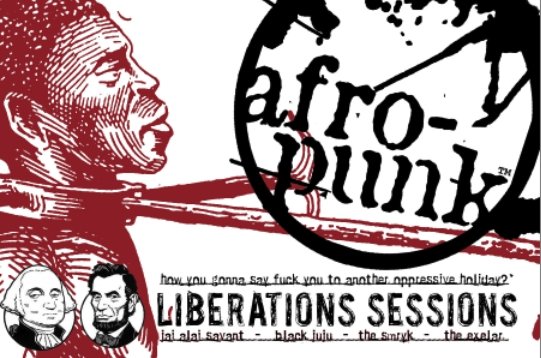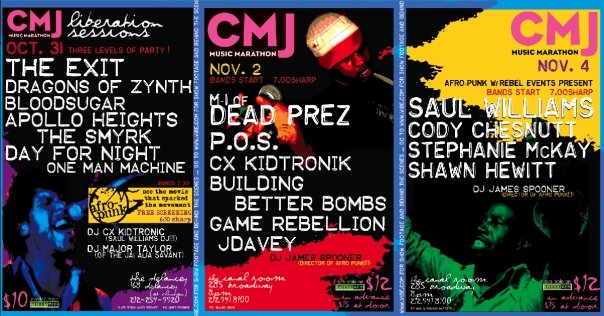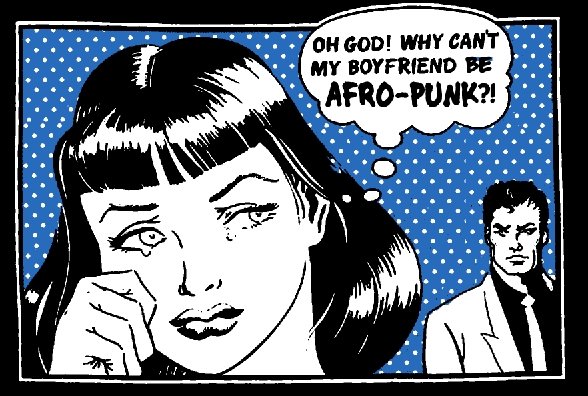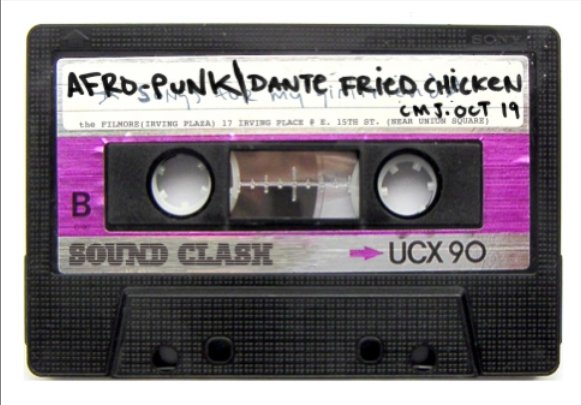James Spooner lived Afropunk. First the film, then the concert. Afro-Punk, the 2003 documentary he directed, showcased a community of Black punk kids in scenes around the country and the world. A culture, presented in the popular media as all white, was suddenly exhibited in its true nuance and Black punk kids around the world knew they weren’t alone. Punk, as a movement, tends to eschew cults of personality, favoring a more DIY approach to community, but Spooner’s name still rings out in certain sections of that world.
As a Black Punk in the mostly white scene of Apple Valley, Southern California, Spooner navigated all manner of assumptions, projections, and racisms thrown his way. He created a zine at sixteen years old and a record label at seventeen. When he moved to New York City at fifteen, Spooner started promoting the type of punk shows he loved. After the success of the Afro-Punk documentary, Spooner and an associate started the Afropunk Festival in 2005, in New York. In its nascent days, Afropunk attracted “positive,” “conscious,” folks far left of center, who came to affirm each other’s joy in existence as much as they came to be entertained by what was happening onstage.
After four years, Spooner left the Afropunk organization. At first, he was tightlipped about the reasons why, but as the years have gone by and the festival he loved has garnered more of an international presence, he’s been speaking about what originally drew him into the promotion and the anti-DIY ethos that caused him to leave. Some say the festival hasn’t been the same since; last year two people wearing shirts that read “Afropunk sold out for white consumption” were kicked out of the VIP section (VIP being a concept that shows how divorced Afropunk is from its original punk values). In the ensuing decade, Spooner has grown to be one of the major voices in Black counter culture, though he seems to prefer a quiet life dedicated to his daughter, his partner, and his artistic pursuits, which include creating tattoos with vegan inks and writing a graphic memoir exploring his early life as a Black Punk in Apple Valley.
Spooner is tall, light skinned, with a clean shaven bald head these days, and he sometimes sports a respectable beard. When he speaks, you can tell he spent some time in NYC; his gift of gab is strong. But his laugh is filled with an almost juvenile joy. Spooner is careful with his words—not litigious, just precise. I get the sense he’s been misrepresented before. He’s not strident, but I imagine if he says something controversial, he means it. And if I misquote him, he’ll let me know.
Spooner has been reticent to throw salt on the current version of Afropunk; he’s been working on keeping his “non-useful” opinions to himself. He is also a workaholic, generating page after page of a new graphic novel while tattooing full-time in the L.A area. We talked in his tattoo studio about the early days of Afropunk.
—Ayize Jama Everett
THE BELIEVER: How did you go from directing the Afro-punk film to creating the Afropunk Festival?
JAMES SPOONER: I did 100 screenings with one intern, all over the country.
On the 100th screening, I wanted to do an event. It was in N.Y. at Urban World film festival, and I wanted Stiffed—Santi White’s band before Santigold —to perform. She told me to reach out to her manager, Matthew Morgan. He went on to become my partner with Afropunk. He was interested in what I was doing and saw an opportunity to get bands like Stiffed signed because record labels were not interested in Black rock bands at the time.
That’s when we started doing the Liberation Sessions, a show we did on bank holidays. We were doing the screening of Afropunk and then showcasing three or four bands in the basement of The Delancey. Upstairs, we’d have various DJs playing anything from rock to house, just trying to pull in an alternative Black crowd. That went on for a couple of years. 
BLVR: So these were the precursors to the Afropunk Festival?
JS: The Liberation Sessions mostly featured tri-state area bands. With the Afropunk festival, my initial goal was to bring in the kids from the Afropunk message board. This was around 2003-2004 when the board was very active. Back then, the website was basically the message board. People all over the country and the world were building friendships, getting to know each other, starting love affairs, and they all wanted to meet up. As Punks do, they started taking it upon themselves to create meetups. Selfishly, I wanted it in New York. We already had the Liberation Sessions scene started, and if we could bring all the people from the message board, we could have a proper weekend.
BLVR: Did you reach out to the Brooklyn Academy of Music or did they reach out to you?
JS: I’d sold out a screening there at the African Diaspora Film Festival. They’d made all the money off of it. I was like, “Why can’t we sponsor our own showing there?” Later, BAM asked how we felt about putting together a Black revolutionary film festival using Afropunk as a kind of theme for the weekend. It just made sense: we’d do a concert at BAM, one at CBGB, one at the Delancey. It was a weekend of three Liberation Sessions and all of these great films. We played the Spook Who Sat by the Door, The Cry of Jazz, The Landlord…
During one festival, I screened the Battle of the Planet of the Apes, the one when the apes actually took over. I suggested the film to these two white guys at BAM, and they’re looking at me like “Tell us more?” because they were film nerds, but they didn’t see how that film connected to what we were doing with Afropunk. I laid out the revolutionary message and popular culture angle for them, and they were into it, if still somewhat confused about how to market it. Whatever studio put it out made a brand new print of it. So if that’s still around, it’s because of me. We screened films at BAM for three years.
BLVR: It seems as though you went from showcasing the film and the bands that were in it, to showcasing the community that was built around the bands and the movie.
JS: We were featuring acts with a $200 guarantee for most of my time, so we didn’t really have access to the big bands. The big ones were Bad Brains and Fishbone, and they were out of our reach. TV on the Radio invited me to screen the Afro-Punk documentary before a show when they were a three-piece band way before the concert existed; we couldn’t afford them after Young Liars. Noisettes were over in London, and we couldn’t afford to fly them over. Bloc Party was way too big for us. Anyways, it was just the bands we had. We did showcase one band from England called Visitor Q which was cool because they flew in. And there was Blood Sugar from LA which was cool. But I could also be getting the years messed up because they all felt the same. We did one show at CBGB which was all girl-fronted bands. I was excited because I got Kimya Dawson to play. Besides that, it was Tamar Kali, Honeychild, the New York Black rock fam. It felt very local.

BLVR: What made the first Afropunk different from the Liberation Sessions?
JS: There were all these kids from other places. It wasn’t about the bands coming from different areas; it was about getting the message board kids. It felt like a community. For me, the community is always the first part. I’ve been apart of a scene since I was 15. The bands are an excuse for the scene to get together. They’re secondary to what’s happening in the audience, which is different from going to a concert. So that’s what I was trying to do with Afropunk because I felt like once there’s a community…
BLVR: What’s the difference between a scene and a community and a movement, which is what Afropunk is sometimes called?
JS: I always say it’s not a scene, it’s not a movement, because it was one company—back then me and Matthew—that put it together, that made shows. Movement and scene are just words to make this show seem like more than a festival. The website, the Instagram, the articles on the website, are just the facade to keep the festival populated. And that’s ok, just know what you’re getting into.
It wasn’t a scene until those kids hung out on their own and put together shows on their own. That’s what started happening. I could see in Chicago they were doing meetups. In Atlanta, they were doing meetups. And in London, they did a show.
It was a weird balancing act because Afropunk was so small, and we were trying to keep control of the brand. We’d seen what happened to the Black Rock Coalition and how, despite their best efforts, they made Black Rock a term associated with some lame bands. We were fighting against that… 
BLVR: Were you trying to resist nostalgia?
JS: I could hear the argument for that but we also had the Objects play. They were a straight up 1977 punk band. So it’s not like I can say we don’t mess with the past. I just didn’t want to make Afropunk another BRC. I have respect for what BRC was trying to do but BRC failed. They had an open door policy where anyone who was Black could join. Anyone who is Black could go to Afropunk, but not all of them could stand onstage. That was my rule. I had two rules when I was booking: you had to have a Black singer, and you had to be good by my standards. That was it.
BLVR: No rules about it being a punk band? Even back in the day?
JS: We had hip-hop groups. P.O.S., from the Doomtree collective and Building Better Bombs, came with an iPod. I had to feel something punk about what was going on, knowwhatimsaying? So when we had an opportunity for Cipher to play with dead prez, I was like “Hell Yes!” because to me, at that time, dead prez was the epitome of what I wanted Afropunk to be, you know? But I also made sure to have a band like Cipher open for them so the audience would have to deal with each other.
These were two black revolutionary bands saying the same thing with different sonic tones. We were putting out the idea that both of the separate fanbases in the crowd would get each other. There was a mosh pit with black girls in headwraps, knowwhatimsaying? They were given permission and felt safe in that space. If Cipher was playing their typical Long Island show with a bunch of white kids and there were only six black girls, they might not feel so safe.
BLVR: When did Afropunk separate from BAM and become its own entity?
JS: The first three years there were films at BAM and concerts elsewhere. The fourth year, Matthew was able to negotiate the BAM parking lot. That was the first outdoor one. You had to pay for the movies, but the concert was free. It was also the first corporate-sponsored one. Toyota and Mountain Dew were the sponsors. That was all Matthew. I’d been a party promoter long enough to know that sponsors put their name and logo on a flyer, and then you get a bunch of money. No harm no foul, right?
BLVR: Corporate sponsorship does seem to be anti-DIY, though.
JS: Which is kind of what started my separation from Afropunk. This was a different type of corporate sponsorship. Like Toyota asked me to blog on their website. They gave me a car for a year. They hired me and four other black “influencers”—a chef, a fashion designer, a gamer—before that was a thing… They tricked out the cars to match our personalities. But they kept censoring me.
I was writing about going to this awesome gay dive bar and seeing a drag show and blah blah blah. And they wouldn’t let me post it. Just straight up, “Nope.” They thought it wouldn’t appeal to that demographic, a black twenty-something male market. I was being censored left and right.
BLVR: I’ve heard other rumors about the perils of Afropunk and marketing.
JS: A really funny one was when Mountain Dew sent beverages, the vast majority of them being Mountain Dew Code Red. When I asked what’s up with the Dew the response I got said target market research indicated Black people like red drinks, the Kool-Aid stereotype. I don’t know, man… I mean they paid for a skate park…
BLVR: Could you see the troubles in the organization as growing pains or was there a cultural shift as well?
JS: It was all getting out of my control. I mean in the fourth show we had a day of all hip-hop acts, and one of the acts was saying a bunch of homophobic stuff. I had to get up and apologize to the crowd. So it was just tension, butting heads between Matthew and me.
A big thing was the message board. Facebook wasn’t out of colleges yet and Matthew, who was never on the board, thought we needed a new website that could compete with Myspace, with tricked-out profiles. Matthew got a new site and a designer. I thought, Progress. Ok, cool. But then they were like, “You can’t port over the old message board.” I told them, “That’s the lifeblood, the community.” The vibe was like, we’ll get more people.
That core community we spent time building were real people within a scene. Those kids are still friends now. People got married off that message board. The fact that it could be so quickly thrown away because a new group of people would populate it? That told me it was more about numbers and how to attract sponsors and appearances.
One day, I went to Afropunk.com and there’s this flashy white website and all that old community was gone. A lot of people left. I stopped paying attention. That was around when I left. It was heartbreaking.
BLVR: I’ve heard people ask, “Where’s the punk in Afropunk these days?”
JS: Objectively, you can say “Oh, we have this Afropunk name but we get these complaints about it not being punk enough so let’s get these bands, whatever…” It doesn’t amount to punk because punk is about community and corporate sponsorship doesn’t align itself with grassroots communities. When people complain to me about Afropunk I’m like, “Dude, it’s just an R&B concert. Go enjoy yourself or don’t go.”
I’ve asked people who know nothing of Afropunk’s history, “Did you leave the festival feeling like you’ve gained community?” So far no one has said yes. They’ve had a great time, they’ve taken awesome pictures, they might have seen some bands. But they didn’t make new friends. They didn’t come home with a second family. The thing is you can’t expect that from a once-a-year event. For a scene to exist it has to be happening on a regular.




